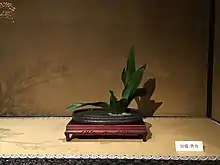Rohdea japonica
Rohdea japonica is a species of plant native to Japan, China and Korea.[2][3][4][5] Common names include Nippon lily, sacred lily, and Japanese sacred lily.
| Rohdea japonica | |
|---|---|
.jpg.webp) | |
| Rohdea japonica 1806 illustration[1] | |
| Scientific classification | |
| Kingdom: | Plantae |
| Clade: | Tracheophytes |
| Clade: | Angiosperms |
| Clade: | Monocots |
| Order: | Asparagales |
| Family: | Asparagaceae |
| Subfamily: | Nolinoideae |
| Genus: | Rohdea |
| Species: | R. japonica |
| Binomial name | |
| Rohdea japonica | |
| Synonyms[2] | |
| |
It is a rhizomatous herbaceous perennial plant, with fibrous roots. The leaves are evergreen, broad lanceolate, 15–50 cm long and 2.5–7 cm broad, with an acute apex. The flowers are produced in a short, stout, dense spike 3–4 cm long, each flower pale yellowish, 4–5 mm long. The fruit is a red berry 8 mm diameter, produced in a tight cluster of several together.
Cultivation and uses

It is cultivated as an ornamental plant. In Chinese it is called wan nian qing (simplified: 万年青; traditional: 萬年青; lit. "evergreen"), and for this reason has been used symbolically in visual culture (e.g. on Mao badges Archived 2014-08-13 at the Wayback Machine). In Japanese it is called omoto.
The plant is also used in traditional Chinese medicine, though it is generally regarded as inedible and possibly toxic.
References
- Curtis's botanical magazine vol. 23 tabl. 898, http://www.botanicus.org/page/482623), John Sims (1749-1831)
- Kew World Checklist of Selected Plant Families
- Tanaka, N. (2010). A taxonomic revision of the genus Rohdea (Asparagaceae). Makinoa , n.s., 9: 1-54.
- Ohwi, J. (1984). Flora of Japan (in English): 1-1067. Smithsonian Institution, Washington, D.C.
- Lee, W.T. (1996). Lineamenta Florae Koreae: 1-1688. Soul T'ukpyolsi: Ak'ademi Sojok.
External links
 Media related to Rohdea japonica at Wikimedia Commons
Media related to Rohdea japonica at Wikimedia Commons Data related to Rohdea japonica at Wikispecies
Data related to Rohdea japonica at Wikispecies- Flora of China: Rohdea japonica
- "Rohdea japonica". Germplasm Resources Information Network. Agricultural Research Service, United States Department of Agriculture.
- Plants for a Future: Rohdea japonica